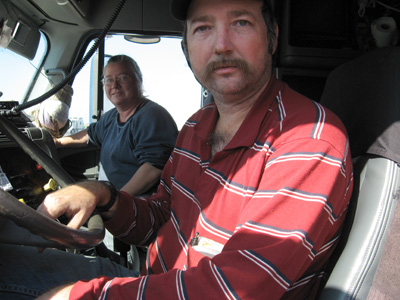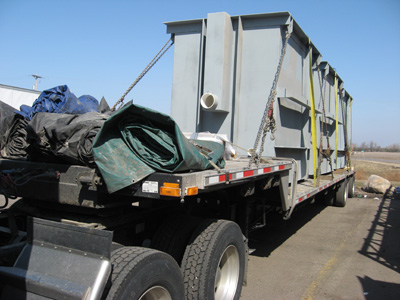
Gasoline rose about 20 cents a gallon this week, a drain on the home economics of most people. But it could always be worse; you could be an independent long-haul trucker.
Take Danny and Carma Glascock of Jermyn, Texas, who are spending the next 34 hours sitting in the TA truckstop in Somerset, Wis. Truckers aren’t allowed to work more than 70 hours in a week and the Glascocks time is up. So today they’re not making a dime.
The rising cost of diesel and inflation in general has made a tough life tougher still for people like the Glascocks. Some truckers pulled off the road earlier this week to protest, but the Glascocks have loan payments to make on their trailer, which this week is hauling a giant tank down to Texas, now that they’ve dropped off a load of acoustical tile in Owatonna.
There was a time when diesel was much cheaper than gasoline; those days are over. Today, diesel was going for $3.99 where the Glascocks filled up. That gets them about 6 miles, and it’s one of the reasons why they’re picking their loads more carefully these days. It’s an art, figuring out how to get the highest-paying loads from Point A to Point B, and having a load someone wants shipped at Point B so you don’t sit for days on end, or you don’t end up with a load that’s costing you more money to move than the shipper is paying.
“It used to be alright to run a cheap load once in awhile,” Danny told me today. “But now you can get into an area that you can’t get out of.” He pulls out a calculator to explain. “Let’s say I get a load that pays $1.80 a mile for a 1,000 mile trip. At $4 a gallon, and six miles to the gallon, it’ll cost me $668 (167 gallons). ” The shipment will pay $1,800. Because he leases himself to a national trucking firm, the Glascocks will get 73 percent of that, or $1,340. “You can’t do 1,000 miles in less than two days,” he says. He figures with the cost of breakdowns, other equipment, and loan payments, he needs to make about $350 a day to survive. His hypothetical trip — a pretty typical one these days — will pay him $336 a day, $14 less than what he needs.

A blown-out tire costs $500. Any mechanical work costs about $85 an hour. He pays $676 a month for the loan he took out for the trailer and once that’s paid off, he figures, it’ll be time to buy a new truck. He has three tarps to cover the loads that wear out regularly and costs them $1,000 to replace.
The Glascocks figure they grossed about $65,000 last year, though they disagree about how much profit they made. “I think we made about $10,000,” Carma says. “I think $20,000,” says Danny.
They’ll figure it out when they get back home to do their taxes. They get home once every three-and-a-half months.

The Glascocks started their trucking career 13 years ago when the factory that employed both closed. “The oil fields in Texas are booming again and I can always go back there and work,” Danny Glascock says, ” but the thing with the oil business is you’ll be looking for work eventually because it’s a boom-bust business. This gives me steady work.”
It’s not all bad, both admit. They like to see the country together. Carma says she enjoyed last Christmas, even though a load didn’t come through and they had to sit and wait for one, missing Christmas with the family. “It’s a good thing we were in Las Vegas,” she says.
As we talked, another truck pulled in within feet of theirs. If it stays, it might be tough for both to sleep tonight, thanks to the idling tractor. That’s not always the case, though. The Glascocks say the load they picked up a few weeks ago was one of the best ever: honeybees. “Nobody parked anywhere near us,” Danny Glascock says. “It was the best nights’ sleep I’ve ever had.”
